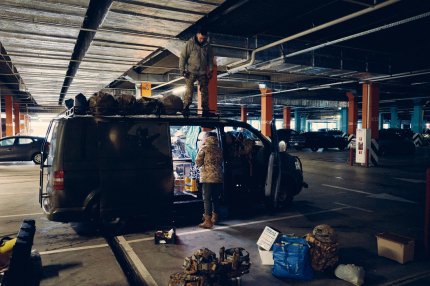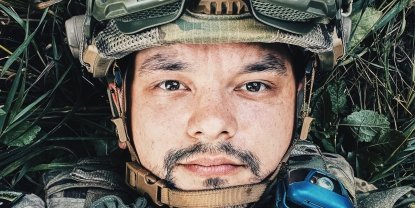Until 2014, Mykyta Zavilinskyi was a professional photographer. At the beginning of the war, he voluntarily went to the front and continued his business — photography. With the start of the full-scale operation, Mykyta adopted the callsign "Maestro". He changed his camera to a military first aid kit and a submachine gun to join the "Hospitaliers" volunteer medical battalion.
In an interview with online.ua, "Maestro" shared candid stories of evacuations. He described what was the most difficult for him as a combat medic and the conditions under which he had to save our servicemen.
I never saw myself as a soldier
At the beginning of the full-scale [invasion], I heard the following phrase from my colleagues: "We chose not to kill others, but to save our own." It seems to me that this romanticised image does not correspond to the realities that exist today. Many medics changed their decision not to take up arms.

"Maestro"
Combat medic of the "Hospitaliers" battalion
I never saw myself in a military role, and unlike many of my friends, I wouldn't say I liked weapons. Still, I wouldn't say I like it, but that doesn't mean I'm avoiding it.
Medics are a priority target for the Russian army
Medics are currently a priority target for the Russians. After all, this is in geometric progression — it increases the number of wounded who will not survive on that part of the front. By killing or injuring one medic, the Russian automatically kills several dozen soldiers.
A combat medic, or a medic as part of an evacuation group, is primarily a combat unit, and the medical component is an additional burden on him. Most often, we are a link that connects the first or second front line with a stabilisational post. We also take the wounded from the first line to the second line.

Combat medics usually encounter a broken, cold country house in the middle of winter. Sometimes, we joke that we are constructbats who pretend to be medevacs. We leave every home we enter in better condition than it was. We patch the roof, insulate it, repair the stove and chimney, etc.
Not everyone can become a combat medic. And not every doctor can be a good combat medic. I encountered personally excellent civilian doctors who, unfortunately, did not find a place at the front in combat conditions.
I saw a person freezing at work. Perhaps he did not fully understand where he would end up. This is one of the natural types of reaction — to freeze in danger. Considering that such a person endangers himself and others in an emergency is essential. Therefore, not everyone can be stormtroopers, snipers, or combat medics. Not everyone can run with burdens along the trenches.

The guy could be saved
The most challenging thing in a combat medic's work is understanding that more lives could be saved. We had a situation where the boy was evacuated for several hours. We brought him without a pulse, with shouts: "He's been without tourniquets for three hours!". We began to carry out resuscitation measures, but unfortunately, it was too late. The boy could have been saved if there had been better communication and a higher level of preparation, and a minor mistake had not been made.
It is difficult to sit on the radio for several hours and listen to how the previous medical link can't carry out an evacuation. There is active artillery, FPV, or shooting combat, and you listen to how they carry a wounded man for six hours, and you can't help.

"Maestro"
Combat medic of the "Hospitaliers" battalion
When my work phase starts, I don't feel anything at that moment. I don't have time to pay attention to my feelings. Most often, the success of my task depends, at a minimum, on one's health and, at the most, on a person's life. You can exhale and analyse your feelings and emotions retrospectively when you have done everything. Being close to death makes you feel more alive than ever.

Medical protocols in war
I've had several cases where guys have said, "Leave me alone. I'm hopeless." Of course, we don't stop helping. We always do what we have. Doctors have specific protocols and care standards. We try not to deviate from them under any circumstances.
Those who are currently involved in developing medical protocols in the United States are beginning to listen to our experience. It goes against their approved protocols, and it helps save lives.
The "golden hour" (the first hour after an injury, during which the provision of qualified medical care should begin), which is prescribed in Western protocols, is very rarely observed in the war realities.
"Soviet" tourniquets and Chinese rubbish
Russians value their personnel much less than we do. I saw their first aid kits, backpacks, and medic bags. There were a bunch of bandages, "Soviet" Esmarch tourniquets (a special device used to stop arterial bleeding — ed.), and butorphanol (a synthetic pain relief — ed.).
Each of our backpacks is packed with several thousand dollars worth of various means. However, in some videos, I saw the Russians have CAT-format tourniquets (a highly effective device for stopping bleeding). Still, in most cases, they have personal development or Chinese rubbish.

"Maestro"
Combat medic of the "Hospitaliers" battalion
Let's be honest: we don't always have the opportunity to pick up the wounded. However, I had not heard of cases where somebody was not taken when there was an opportunity. We have also seen many videos and testimonies of Russians abandoning their own [soldiers].
I keep cutting and cutting, but there is no blood
The most memorable situation occurred at the last rotation. There was a hit to the guys' dugout. At that moment, one of the fighters was sleeping there. During the flight, he woke up and felt that he was wounded in the hand. The soldier was put on a tourniquet and sent for evacuation. After an hour and a half, he finally arrived at our place.
I needed to examine the wound. Ideally, [I need] to replace the tourniquet with a tamponade with a bandage or make a bandage. It was winter outside. The fighter was wearing 3-4 layers of clothing, and a tourniquet on the upper third of his shoulder. I had to cut through my clothes to get to the wound. I keep cutting and cutting, but there is no blood. I cut to the turnstile itself and see that there is no injury. I cut the jacket completely to examine him, and he is fine. We stop in the middle of the road, the soldier says: "Take me back. I have fellas there."
As a result, it turned out that a piece of wood or roots hit his hand. It was a soft tissue injury. The fighter thought he was wounded when he got out of sleep. However, the story didn't end there.
In a few days, a fragment flew into the soldier's hand; this time, it was real. He put the same tourniquet on, which cannot be done. Last time, the fighter took a tourniquet for himself in memory of a funny incident. The whole group laughed with the military man the next time we saw him during the evacuation.

Among my civilian friends or acquaintances, there is probably no one who doesn't know how to apply a tourniquet. At least they won't admit they can't. I hope enough people understand why it's essential to be able to do this.
Mental health in the military
Death is a factor that must be consciously accepted and moved on. Since I have been spending a relatively large amount of time in civilian conditions, I noticed that I began to switch more quickly over time.
Taking care of yourself and paying attention to your mental health is important. Visits to a psychologist or psychotherapist are now accepted as usual. Even if you don't feel you are melting here and now, it is better to go for a consultation. I also recommend doing health checks occasionally, [because] it won't hurt.

"Maestro"
Combat medic of the "Hospitaliers" battalion
You have to allow yourself some small joys. Probably, buying a Lamborghini Urus is a bit of a bend, but shutting yourself up at home and denying yourself communication with friends is the worst thing you can do to yourself.
The connection with a peaceful life helps me a lot. From time to time, you should put everything aside and get stuck at home in the evening watching some flm. The greater the load on a person, the more he should pay attention to rest and self-preservation. For example, my volunteer friends arrange small outings from time to time to take a breather.
We've lost many incredible people
War is a reality that we have to accept and live with. During this time, I've probably become more direct. My tolerance for some kind of delusion has decreased.
Before the large-scale invasion, I was not a team player. It was more comfortable for me to solve some tasks myself. Since my school years, team sports have not been my thing. In the war, I had to be a team player and then a group commander. It wasn't typical for me, and it became a new experience in which I had to get involved.

I think we will feel and be able to understand the fundamental changes of the war only sometime after the victory.
I see that we, as a society, are progressing gradually. During these ten years, Ukrainians have come a long way as a nation. We have lost many incredible people. However, the level of our transformation is colossal.

"Maestro"
Combat medic of the "Hospitaliers" battalion
We have to do even more; otherwise, all the sacrifices made during not even ten years but several centuries would have been in vain.
We should unite even more out of respect for all those who gave their lives and health.

